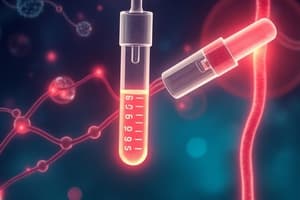Podcast
Questions and Answers
What is a primary cause of benign prostatic hyperplasia (BPH)?
What is a primary cause of benign prostatic hyperplasia (BPH)?
Which of the following is NOT a common symptom of BPH?
Which of the following is NOT a common symptom of BPH?
What type of examination is performed to check the size and consistency of the prostate?
What type of examination is performed to check the size and consistency of the prostate?
Which medication class is primarily used to improve urine flow in patients with BPH?
Which medication class is primarily used to improve urine flow in patients with BPH?
Signup and view all the answers
Cushing's Syndrome is primarily characterized by high levels of which hormone?
Cushing's Syndrome is primarily characterized by high levels of which hormone?
Signup and view all the answers
What is a possible cause of Addison's Disease?
What is a possible cause of Addison's Disease?
Signup and view all the answers
Which of the following can be a diagnostic tool to visualize prostate size?
Which of the following can be a diagnostic tool to visualize prostate size?
Signup and view all the answers
What is a common treatment option for HPH that aims to shrink the prostate over time?
What is a common treatment option for HPH that aims to shrink the prostate over time?
Signup and view all the answers
What role does insulin play in the body?
What role does insulin play in the body?
Signup and view all the answers
What is insulin resistance?
What is insulin resistance?
Signup and view all the answers
Which of the following is a characteristic symptom of high blood sugar?
Which of the following is a characteristic symptom of high blood sugar?
Signup and view all the answers
What typically happens when blood sugar rises after eating?
What typically happens when blood sugar rises after eating?
Signup and view all the answers
What is a primary cause of Type 1 Diabetes?
What is a primary cause of Type 1 Diabetes?
Signup and view all the answers
Which management method is commonly used for Type 1 Diabetes?
Which management method is commonly used for Type 1 Diabetes?
Signup and view all the answers
What complication is NOT commonly associated with uncontrolled high blood sugar?
What complication is NOT commonly associated with uncontrolled high blood sugar?
Signup and view all the answers
How does Type 2 Diabetes differ from Type 1 Diabetes?
How does Type 2 Diabetes differ from Type 1 Diabetes?
Signup and view all the answers
Study Notes
Insulin
- Insulin is a hormone produced by the pancreas
- It facilitates glucose entry into cells for energy
- Normal insulin function involves:
- Blood sugar rising after eating
- Pancreas releasing insulin into the bloodstream
- Insulin binding to cell receptors
- Cells absorbing glucose from the blood
- Blood sugar returning to normal
Insulin Resistance
- Insulin resistance is a condition where cells don't respond effectively to insulin
- Associated with:
- Elevated blood sugar after eating
- Pancreas releasing insulin but cells not responding effectively
- Glucose not entering cells easily
- Elevated blood sugar levels
- Pancreas attempting to compensate by producing more insulin
Diabetes Mellitus
- Diabetes mellitus is a group of metabolic diseases characterized by chronic hyperglycemia (high blood sugar)
- Symptoms of high blood sugar:
- Frequent urination (polyuria)
- Excessive thirst (polydipsia)
- Increased hunger (polyphagia)
- Unexplained weight loss
- Blurred vision
- Slow-healing sores
- Frequent infections
- Long-term complications of uncontrolled high blood sugar:
- Heart disease and stroke
- Kidney disease
- Eye problems (retinopathy)
- Nerve damage (neuropathy)
- Foot problems
Insulin Types
- Different types of insulin have varying onset, peak, and duration times, impacting when they're used
- Rapid-acting insulins (Lispro, Aspart, Glulisine), Short-acting (Regular), Intermediate-acting (NPH), Long-acting (Glargine, Detemir), and Ultra-long-acting (Degludec).
- Insulin types are used for different times of the day for patients with diabetes based on the needs of the specific patient
Regulation of Insulin & Glucagon
- Insulin facilitates glucose entry into cells for energy storage
- Glucagon increases blood glucose levels, releasing glucose from the liver to manage low blood sugar
- Various factors, including hormones, stimulate or inhibit insulin and glucagon release
Benign Prostatic Hyperplasia (BPH)
- BPH is a non-cancerous prostate enlargement
- Causes include:
- Aging
- Elevated DHT (dihydrotestosterone) levels
- Family history
- Symptoms:
- Hesitancy
- Intermittency/incontinence
- Frequency
- Fullness
- Urgency
- Nocturia
BPH Diagnosis and Treatment
- Diagnosis often involves:
- Digital rectal exam (DRE)
- Prostate-specific antigen (PSA) test
- Ultrasound or MRI
- Treatments commonly include
- Alpha blockers (e.g., tamsulosin)
- 5-alpha-reductase inhibitors (e.g., finasteride)
- Surgical options
Cushing's Syndrome
- Occurs due to high cortisol secretion
- Causes:
- Tumors in pituitary or adrenal glands
- Corticosteroid use
- Symptoms may include:
- Personality changes
- Moon face
- Increased susceptibility to infection
- Fat deposits (especially on the back)
- Osteoporosis
- Treatment involves managing cortisol levels, addressing the cause
Addison's Disease
- Characterized by low cortisol and aldosterone secretion
- Common causes include autoimmune damage to adrenal glands
- Symptoms often include:
- Low blood pressure
- Low sodium (hyponatremia)
- Muscle weakness
- Weight loss
- Skin changes
- Fatigue
Addison's Disease & Cushing's Disease Comparison
- Addison's Disease: Low cortisol, low aldosterone
- Cushing's Disease: High cortisol
Studying That Suits You
Use AI to generate personalized quizzes and flashcards to suit your learning preferences.
Related Documents
Description
This quiz explores the roles of insulin, the issue of insulin resistance, and the implications of diabetes mellitus. Understand how insulin functions in the body, the effects of resistance, and the symptoms associated with diabetes. Test your knowledge on these crucial health topics.




